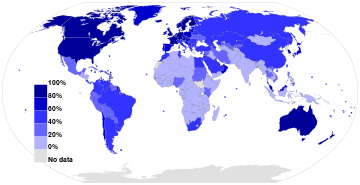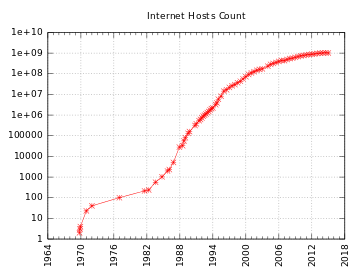So Who Really Owns The Internet? The U.S. Says It Does!
Posted By thestatedtruth.com on September 13, 2016
 Internet users in 2012 as a percentage of a country’s population
Internet users in 2012 as a percentage of a country’s population
Map Source: International Telecommunications Union
The internet originated in the U.S. back in the 1950’s…As we fast forward to the 1990’s we saw a revolution in web users which was triggered in September 1993 by NCSA Mosaic, a graphical browser which eventually ran on several popular office and home computers. This was the first web browser aiming to bring multimedia content to non-technical users, and therefore included images and text on the same page, unlike previous browser designs.
Mosaic was developed at the National Center for Supercomputing Applications (NCSA) at the University of Illinois Urbana-Champaign beginning in late 1992. NCSA released the browser in 1993, and officially discontinued development and support on January 7, 1997. However, it can still be downloaded from NCSA.
Netscape Navigator was later developed by Netscape, which employed many of the original Mosaic authors; however, it intentionally shared no code with Mosaic. Netscape Navigator’s code descendant is Mozilla Firefox. Starting in 1995 Mosaic lost a lot of share to Netscape Navigator, and by 1997 only had a tiny fraction of users left, by which time the project was discontinued. Microsoft licensed the browser to create Internet Explorer in 1995.
 Chart Source: Internet Systems Consortium
Chart Source: Internet Systems Consortium
By Dustin Volz
WASHINGTON (Reuters) – Major technology companies including Facebook, Google and Twitter are urging Congress to support a plan for the U.S. government to cede control of the internet’s technical management to the global community, they said in a joint letter dated on Tuesday.
The U.S. Commerce Department has primary oversight of the internet’s management, largely because it was invented in the United States. Some Republican lawmakers are trying to block the handover to global stakeholders, which include businesses, tech experts and public interest advocates, saying it could stifle online freedom by giving voting rights to authoritarian governments.
The years-long plan to transfer oversight of the nonprofit Internet Corporation for Assigned Names and Numbers, or ICANN, is scheduled to occur on Oct. 1 unless Congress votes to block the handover. The California-based corporation operates the database for domain names such as .com and .net and their corresponding numeric addresses that allow computers to connect.
In the Sept. 13 letter, a copy of which had been reviewed by Reuters before it was sent, the technology companies said it was “imperative” that Congress does not delay the transition.
“A global, interoperable and stable Internet is essential for our economic and national security, and we remain committed to completing the nearly twenty year transition to the multi stakeholder model that will best serve U.S. interests,” the letter said.
Other signatories include Amazon, Cloudflare, Yahoo and several technology trade organizations.
Former presidential hopeful Senator Ted Cruz of Texas, who leads the opposition against the handover, will hold a congressional hearing on Wednesday to review the transition, which he has criticized as a “giveaway of our internet freedom.”
Tech companies, technical experts and academics have said the transition is overdue and necessary to keep the Internet open and globally oriented, and that the proposal includes safeguards against any potential abuse by any one country.
(This version of the story adds dropped word in fourth paragraph)
(Reporting by Dustin Volz; Editing by Richard Chang)
From Wikipedia:
The World Wide Web (sometimes abbreviated “www” or “W3”) is an information space where documents and other web resources are identified by URIs, interlinked by hypertext links, and can be accessed via the Internet using a web browser and (more recently) web-based applications. It has become known simply as “the Web”. As of the 2010s, the World Wide Web is the primary tool billions use to interact on the Internet, and it has changed people’s lives immeasurably.
Precursors to the web browser emerged in the form of hyperlinked applications during the mid and late 1980s (the bare concept of hyperlinking had by then existed for some decades). Following these, Tim Berners-Lee is credited with inventing the World Wide Web in 1989 and developing in 1990 both the first web server, and the first web browser, called WorldWideWeb (no spaces) and later renamed Nexus. Many others were soon developed, with Marc Andreessen‘s 1993 Mosaic (later Netscape), being particularly easy to use and install, and often credited with sparking the internet boom of the 1990s. Today, the major web browsers are Firefox, Internet Explorer, Google Chrome, Opera and Safari.
A boost in web users was triggered in September 1993 by NCSA Mosaic, a graphical browser which eventually ran on several popular office and home computers. This was the first web browser aiming to bring multimedia content to non-technical users, and therefore included images and text on the same page, unlike previous browser designs; its founder, Marc Andreessen, also established the company that in 1994, released Netscape Navigator, which resulted in one of the early browser wars, when it ended up in a competition for dominance (which it lost) with Microsoft Windows‘ Internet Explorer. Commercial use restrictions were lifted in 1995. The online service America Online (AOL) offered their users a connection to the Internet via their own internal browser.

Comments